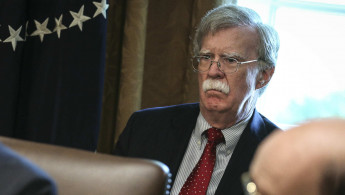Could John Bolton's disgust of the UN force a resolution in Western Sahara?
After decades of unrelenting efforts to resolve the Western Sahara standoff, the African Union has seemingly decided to hand over the major role in its resolution to the United Nations, with the US trying to emerge as a key player.
The plight of Western Sahara was first brought to global attention through the African Union, which presented the 1989 ceasefire proposal agreed by the international community and the 1991 peace deal which promised the Sahrawi people a referendum that has yet to take place.
The African Union is now handing over responsibility to the UN after failing to achieve a tangible result.
Endless rounds of talks have failed to end the stalemate over the status of Western Sahara.
Horst Kohler, the UN Secretary-General's special envoy, arrived last year as a new face on the scene to reactivate the years-long attempts, and has been pushing the UN to call for direct talks, reportedly as a result of pressure from the United States.
While the AU's approach might not be surprising, less than a year after Morocco returned to the African bloc - given the economic interests the kingdom holds within the continent - the United Nations efforts to resolve the Western Sahara issue have been limited to repetitive negotiations and meetings without even being able to bring the two parties to the same table for more than eight years.
At the most recent UN Security Council meeting, pressure mounted to revive the talks after US insistence on renewing the mandate for MINURSO, the UN peacekeeping mission in Western Sahara, for a limited period of six months only - despite France's demands for a one-year mandate.
Twitter Post
|
This new US intervention is believed to have been masterminded by John Bolton, President Donald Trump's national security adviser, whose stances against MINURSO have previously been taken by many in Western Sahara as support for the Polisario Front. He has also pushed for the review of any future renewal of MINURSO's mandate.
Amy Tachco, one of the State Department's representatives at the UN, hinted as much when the resolution was adopted at the Security Council.
"We will then need to take a hard look at our work and our responsibilities when the mission again comes up for renewal in six months," she said.
There remains disagreement between veto holders on the Security Council, with France notably preferring former administrations' positions of being loosely pro-Morocco. The Trump administration has however chosen to have the last word, leading the Moroccan government to dig deeper into strategies to bring Bolton onside.
And who does John Bolton hate even more than costly UN missions that go on indefinitely? Iran.
Morocco alleges that there is military cooperation between the Algerian-backed Polisario and the Iran-backed Hizballah.
This anti-Iran policy was leveraged by pro-Morocco members of Congress to score their first non-binding bill in Congress 2018.
The upcoming UN Security Council meeting on October 29 to renew the MINURSO mandate once more will clarify how serious the US is in pressuring the Western Sahara peacekeeping mission to find a solution to the desert conflict.
Habibulah Mohamed Lamin is a journalist formerly based in the Western Sahara refugee camps in Tindouf, Algeria. He has worked as a translator and is director of Equipe Media Branch, a group of media activists covering Western Sahara. His work focuses on the politics and culture of the Maghreb.
Follow him on Twitter: @habibullahWS



